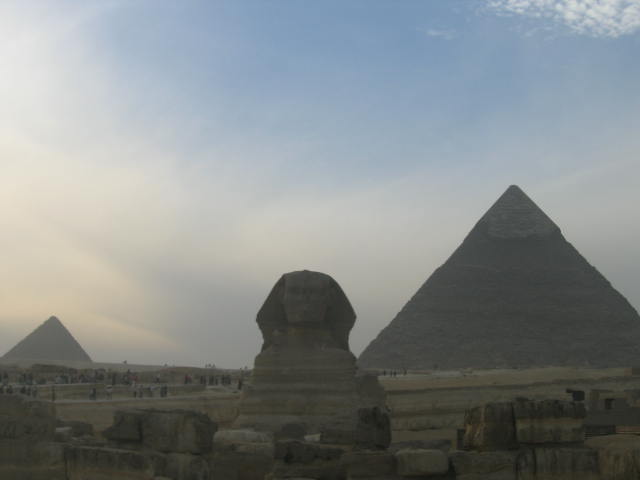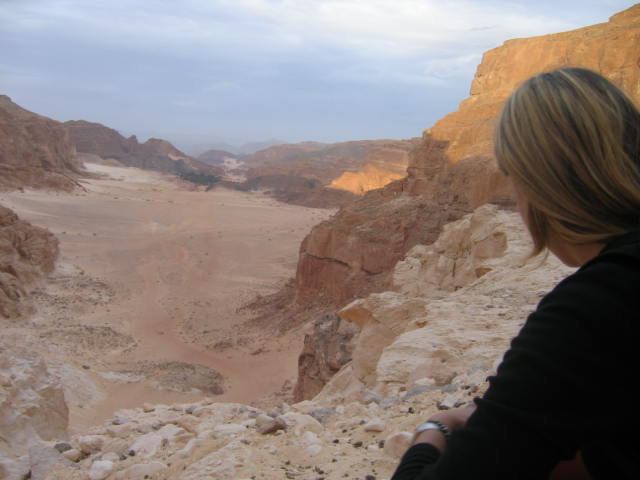


Photos. 1. Pyramids. 2. Ain Hudra Oasis appears suddenly beyond a rocky hill. 3. Unexpected New Year’s Eve with our taxi driver.
Nthe number 400 seemed to much of a superlative to designate the tattered, rusty, shaky bus that was delivering me to Cairo International Airport, where Sigita’s plane would land at 2:10. At the sight of a foreigner in the bus, the ticketman chopped the 25 piastra ticket off with a mix of pride and skepticism. Asked if the bus was going in fact to the airport, the same man raised his hands to heaven and exclaimed: “Imashallah!” (God wanting), which shows how in the Middle East the idea of God is intimately interwoven with lapses of random efficiency.
No less than bus number 400, the way in which Sigita and I had met leads to the search of the threads beyond the puppet, and makes one wonder if things happen for a reason or simply happen. It was an afternoon of the last August. I had crossed that morning the Lithuanian border from Latvia, by hitchhiking as usual, and in the moment I walked along the Green Bridge, the sign bearing the phrase “Aplink Pasauli” was still hanging from my backpack. Admiring the peculiar contrast between the soviet style hammer-in-hand worker ornamenting the gate of the bridge and the towers of the newly built Europa Center behind, I had almost forgotten I was after a supermarket. Sigita was also crossing the bridge on foot, due to a mechanic failure of her Mazda, with the lazy pace that all visit to the dentist should inspire in normal people. Our eyes met for the first time over the question: where is the supermarket?” Now, an old taxi that reproduced with fidelity the sound of an oil generator was driving us to the infamous 2-dollars-a-night pension. In the ground floor of the fin de secle building, a wooden elevator that may have once accomodated french speaking aristocracies now lifted and landed glossy eyed penniless backpackers.
Our room seemed straight out of a Dostoievsky novel. And I say it with all the tenderness that I feel when confronted with sheets where the cigarette holes form constelations. Sigi downed her backpack and started to unpack. It seemed logic to me that the first thing to come out was a bag with fish. The second was a Polish map of Egypt and the third a complete make up set. When her succesful career as graphic designer is not keeping her busy, Sigi ocassionaly poses for the camara. I almost don’t believe her when she says that there are now posters with her picture in downtown Vilnius. That the girl-in-the-picture was gonna end hitchhiking in roads side by side with camel and donkey karts is something that the man-in-the-corner at Vilnius surely ignores. But nothing new for Sigi, who until the age of 12 used to accompany his father –journalist- in his trips around the ex USSR.
In any case, some adjustments needed be made. The fact that our first walk would take place in the most conservative area of Cairo –the Old City- didn’t seem to attenuate the cosmetic powers of Sigi’s make up set. As she was getting prettier with every second, I didn’t have the courage to halt such a promising process with the mundane proposition of: “Hey! This is an islamic country!”. The result was –of course- in the jammed alleys of the bazaar, a massive abandon of Qoran by vendors who lost control of their jaws to exclaim a lascive: “Welcome to Egypt!”. Next time, Sigi rolled a scarf round her neck.
Nthe number 400 seemed to much of a superlative to designate the tattered, rusty, shaky bus that was delivering me to Cairo International Airport, where Sigita’s plane would land at 2:10. At the sight of a foreigner in the bus, the ticketman chopped the 25 piastra ticket off with a mix of pride and skepticism. Asked if the bus was going in fact to the airport, the same man raised his hands to heaven and exclaimed: “Imashallah!” (God wanting), which shows how in the Middle East the idea of God is intimately interwoven with lapses of random efficiency.
No less than bus number 400, the way in which Sigita and I had met leads to the search of the threads beyond the puppet, and makes one wonder if things happen for a reason or simply happen. It was an afternoon of the last August. I had crossed that morning the Lithuanian border from Latvia, by hitchhiking as usual, and in the moment I walked along the Green Bridge, the sign bearing the phrase “Aplink Pasauli” was still hanging from my backpack. Admiring the peculiar contrast between the soviet style hammer-in-hand worker ornamenting the gate of the bridge and the towers of the newly built Europa Center behind, I had almost forgotten I was after a supermarket. Sigita was also crossing the bridge on foot, due to a mechanic failure of her Mazda, with the lazy pace that all visit to the dentist should inspire in normal people. Our eyes met for the first time over the question: where is the supermarket?” Now, an old taxi that reproduced with fidelity the sound of an oil generator was driving us to the infamous 2-dollars-a-night pension. In the ground floor of the fin de secle building, a wooden elevator that may have once accomodated french speaking aristocracies now lifted and landed glossy eyed penniless backpackers.
Our room seemed straight out of a Dostoievsky novel. And I say it with all the tenderness that I feel when confronted with sheets where the cigarette holes form constelations. Sigi downed her backpack and started to unpack. It seemed logic to me that the first thing to come out was a bag with fish. The second was a Polish map of Egypt and the third a complete make up set. When her succesful career as graphic designer is not keeping her busy, Sigi ocassionaly poses for the camara. I almost don’t believe her when she says that there are now posters with her picture in downtown Vilnius. That the girl-in-the-picture was gonna end hitchhiking in roads side by side with camel and donkey karts is something that the man-in-the-corner at Vilnius surely ignores. But nothing new for Sigi, who until the age of 12 used to accompany his father –journalist- in his trips around the ex USSR.
In any case, some adjustments needed be made. The fact that our first walk would take place in the most conservative area of Cairo –the Old City- didn’t seem to attenuate the cosmetic powers of Sigi’s make up set. As she was getting prettier with every second, I didn’t have the courage to halt such a promising process with the mundane proposition of: “Hey! This is an islamic country!”. The result was –of course- in the jammed alleys of the bazaar, a massive abandon of Qoran by vendors who lost control of their jaws to exclaim a lascive: “Welcome to Egypt!”. Next time, Sigi rolled a scarf round her neck.
And when is this guy start to talk about the Pyramids? It was an Arabic scholar who said: “All things fear time, but time fear the Pyramids”. We all have a timeless mental image of them, in solemn rest amid endless sands. As a result it comes as a surprise to discover that the Sphynx actually faces the 15 million souls megalopolis. How many millons were born, sweated, and died in front of her eyes? We all should have a Sphynx in our garden to remember the importance of the fugitive moment.
New Year’s Eve took place in a Chinese restaurant. On the way back, our taxi driver could only hit the right address of our hotel after one hour. So at midnight we were opening our cans of Stella in the back seat of a 1960 Fiat, while our drive shoutted out the name of our hotel to passers by with the hope somebody would give him a hint.
Next day we set off for the Sinai, where we started to hitch hike, passing on foot the Egyptian police check points. While hitch hiking in Egypt is in theory illegal, nobody can stop those who declare to be traveling on foot. When the officials read “Lietuvos Pasas” in Sigi’s passport, they ask what part of the universe is that. Somebody with a machine gun suggests that it is a part of Russia.For Sigi, whose parents lived closely the events of January 13, that is pretty much an insult. “Thanks God you are not from Kaliningrad” – I tell her. When my time comes and I say Argentina, the guys recite a list of football players. Diego has become a sort of password. All the same they let us through. Each time. We then visited the sea side paradises of Dahab and Tarabin, where Sigi would say, in a full demostration of Baltic character, that fish, colourful or not, are to eat and not to see behind a diving mask. On the way back to Cairo we crossed the inner desert of Sinai, many times sharing the truck cabin with egyptian workers hitchiking themselves. We stay overnight in Ain Hudra Oasis, where false beduins dedicated to tourism approach us to sell camel rides, while their daughters spy the West trough the shortcut of Sigi’s cosmopolitan magazine.
On January 9th a plane took off from Cairo Intl Airport. Sigi was inside. Time for me to start to investigate how to get iraqi, iranian, pakistani and afghan visas…

No comments:
Post a Comment